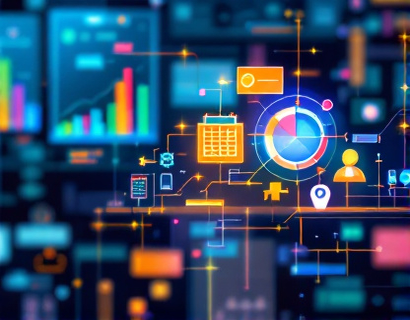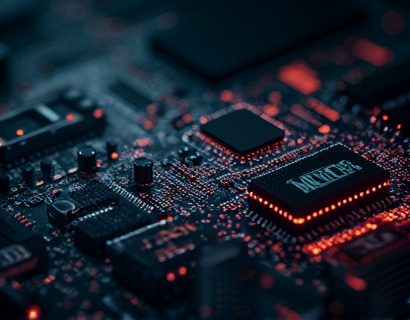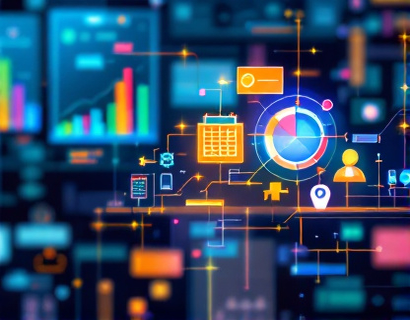Revolutionizing App Marketing in the Ucosystem: The Synergy of Crypto and AI
The digital landscape is undergoing a profound transformation, driven by the convergence of cryptocurrency and artificial intelligence. This fusion is not just a technological curiosity but a powerful force reshaping app marketing and user experiences within the Ucosystem. For tech enthusiasts and crypto innovators, understanding this synergy is crucial to staying ahead in a rapidly evolving market.
The Ucosystem, a term encompassing the interconnected network of applications, services, and platforms that leverage blockchain technology, is witnessing a paradigm shift. Cryptocurrency, with its decentralized and secure nature, provides a robust foundation for transactions and data management. Meanwhile, AI brings intelligent automation and personalized experiences to the forefront. Together, they are revolutionizing how apps are marketed and how users interact with them.
Blockchain's Role in App Marketing
Blockchain technology offers several advantages that directly impact app marketing. First, it ensures transparency and trust. Every transaction and interaction within the Ucosystem can be recorded on a blockchain, providing an immutable and verifiable history. This transparency builds trust among users, who can see exactly how their data is used and how transactions are processed.
Second, blockchain enables secure and efficient microtransactions. Traditional app monetization models often rely on centralized payment gateways, which can be slow and costly. Blockchain-based systems allow for instant, low-cost transactions, making it feasible to reward users for engagement, referrals, and content creation. This not only enhances user motivation but also creates new revenue streams for app developers.
AI-Driven Personalization
Artificial intelligence plays a pivotal role in personalizing the user experience within the Ucosystem. AI algorithms analyze vast amounts of user data to identify patterns and preferences, enabling apps to deliver tailored content and recommendations. This level of personalization increases user engagement and satisfaction, leading to higher retention rates and positive word-of-mouth.
For instance, AI can optimize ad placement by predicting which ads a user is most likely to click on based on their behavior and interests. This not only improves the user experience by reducing ad fatigue but also increases ad revenue for app developers. Moreover, AI-powered chatbots and virtual assistants provide 24/7 customer support, addressing user queries in real-time and enhancing overall service quality.
Decentralized Marketing Strategies
The integration of blockchain and AI opens up new possibilities for decentralized marketing strategies. Traditional marketing often relies on centralized entities to manage and distribute campaigns, which can be prone to manipulation and lack of authenticity. Decentralized marketing, on the other hand, empowers users and content creators to directly engage with their audience.
Through blockchain-based platforms, app developers can create tokenized rewards for content creators, incentivizing high-quality content and authentic engagement. AI can further enhance this by analyzing the performance of different content types and recommending strategies to maximize reach and impact. This decentralized approach not only fosters a more democratic and transparent marketing ecosystem but also reduces the risk of fraud and spam.
Enhanced Data Security and Privacy
Data security and privacy are paramount concerns in the digital age. Blockchain technology offers robust solutions to these issues by providing a secure and decentralized way to store and manage user data. Unlike centralized databases, which are vulnerable to hacking and data breaches, blockchain's distributed ledger ensures that data is spread across multiple nodes, making it extremely difficult to compromise.
AI complements this by implementing advanced encryption and anonymization techniques. Machine learning algorithms can detect and prevent anomalous activities, such as unauthorized access attempts or data leaks. This dual approach ensures that user data remains secure and private, building trust and encouraging more users to engage with apps in the Ucosystem.
Tokenization of App Assets
Tokenization, a key feature of blockchain technology, allows for the creation of digital tokens that represent assets within the Ucosystem. These tokens can be used to represent ownership, access rights, or even in-app currency. By tokenizing app assets, developers can create more flexible and user-centric monetization models.
For example, tokens can be used to grant users exclusive access to premium content or features, creating a new form of subscription-based revenue. Additionally, tokens can be traded on decentralized exchanges, giving users the ability to monetize their engagement and loyalty. AI can optimize the distribution and valuation of these tokens, ensuring fair and efficient market dynamics.
Predictive Analytics and User Behavior Analysis
AI-driven predictive analytics is another powerful tool in the Ucosystem. By analyzing user behavior data, AI can forecast trends, identify potential churn, and predict user actions. This foresight allows app developers to proactively address issues and tailor their marketing strategies to meet user needs more effectively.
For instance, AI can identify users who are at risk of leaving the app and trigger personalized retention campaigns. It can also recommend new features or content based on user preferences, keeping the app fresh and engaging. This level of insight not only improves user satisfaction but also enhances the overall effectiveness of marketing efforts.
Challenges and Considerations
While the integration of blockchain and AI in app marketing offers numerous benefits, it also presents several challenges. One major concern is the regulatory landscape. The use of cryptocurrencies and blockchain technology is still evolving, and regulations vary widely across different regions. App developers must navigate these complexities to ensure compliance and avoid legal issues.
Another challenge is the technical complexity involved in implementing these advanced technologies. Developers need a solid understanding of both blockchain and AI to design and maintain robust systems. This requires significant investment in talent and infrastructure, which can be a barrier for smaller players in the Ucosystem.
Privacy concerns also remain a critical issue. While blockchain enhances data security, the transparency of the ledger can raise questions about user privacy. It is essential to strike a balance between transparency and privacy, ensuring that user data is protected while still benefiting from the advantages of blockchain.
Future Prospects
The future of app marketing in the Ucosystem looks promising, with blockchain and AI continuing to drive innovation. As these technologies mature, we can expect even more sophisticated applications and integrations. For instance, the development of interoperable blockchain networks will facilitate seamless interactions across different platforms and services, creating a more unified and efficient Ucosystem.
Moreover, the advancement of AI, particularly in areas like natural language processing and computer vision, will further enhance personalized experiences and automated marketing processes. The combination of these technologies will not only transform app marketing but also redefine the entire digital experience, making it more intuitive, secure, and rewarding for users.
For tech enthusiasts and crypto innovators, embracing this synergy is essential to stay competitive and relevant. By leveraging the power of blockchain and AI, they can unlock new opportunities and drive meaningful change in the Ucosystem. Whether you are a developer, marketer, or user, understanding and adapting to these advancements will be key to thriving in the digital age.










































